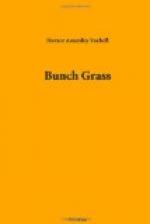“Mon Dieu! an’ zey tell ’im nossing. Saperlipopette! Come wiz me. I can trust you. You shall know my secret, too.”
We followed him in silence up the path which led to the bungalow, and into the house. The Baron unlocked a door and unbolted some shutters. We saw two portraits, splendid portraits of two handsome young men in uniform. Above the mantelpiece hung an emblazoned pedigree: the family tree of the Bourgueil-Crotanoy, peers of France. The Baron laid a lean finger upon one of the names.
“I am Rene de Bourgueil-Crotanoy,” he said.
We waited. When he spoke again his voice had changed. It was the voice of a very old man, tired out, indifferent, poignantly feeble.
“My boys,” said he, indicating the two young men, “zey are dead; no one of ze old Bourgueil-Crotanoy is left except me—and I, as you see, am half dead. Perhaps I was too proud; my confessor tell me so, always. I was—I am still—proud of my race, of my chateau. I was not permitted to serve Republican France, but I gave her my boys. They went to Tonquin; I remained at home, thinking of ze day when zey would return, and marry, and give me handsome grandchildren. Zey did—not— return. Zey died. One in battle, one of fever in ze hospital. What was left for me, mes amis? Could I live on in ze place where I had seen my children and my children’s children? No. Could I meet in Paris ze pitying eyes of friends?”
* * * * *
Years afterwards, Ajax and I found ourselves in Morbihan. We paid a pilgrimage to the Chateau de Bourgueil-Crotanoy, and entered the chapel where the last of the Bourgueil-Crotanoy is buried. A mural tablet records the names, and the manner of death, of the two sons. Also a line in Latin:
“’Tis better to die young than to live on to behold the misfortunes and emptiness of an ancient house.”
XIV
JIM’S PUP
Jim Misterton was a quiet, reserved fellow, who had come straight to Paradise from a desk in some dingy London counting-house. He told us that something was wrong with his lungs, and that the simple life had been prescribed. He was very green, very sanguine, and engaged to be married—a secret confided to us later, when acquaintance had ripened into friendship. Every Sunday Jim would ride down to our ranch, sup with us, and smoke three pipes upon the verandah, describing at great length the process of transmuting the wilderness into a garden. He built a small board-and-batten house, planted a vineyard and orchard, bought a couple of cows and an incubator. Reserved about matters personal to himself, he never grew tired of describing his possessions, nor of speculating in regard to their possibilities. If ever a man counted his chickens before the eggs had been placed in the incubator, Jim Misterton was he.
Ajax and I listened in silence to these outpourings. Ajax contended— perhaps rightly—that Misterton’s optimism was part of the “cure.” He bade me remark the young fellow’s sparkling eyes and ruddy cheeks.




